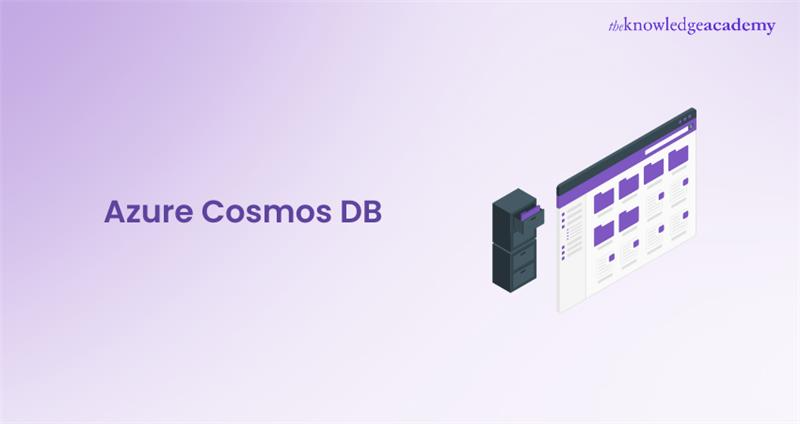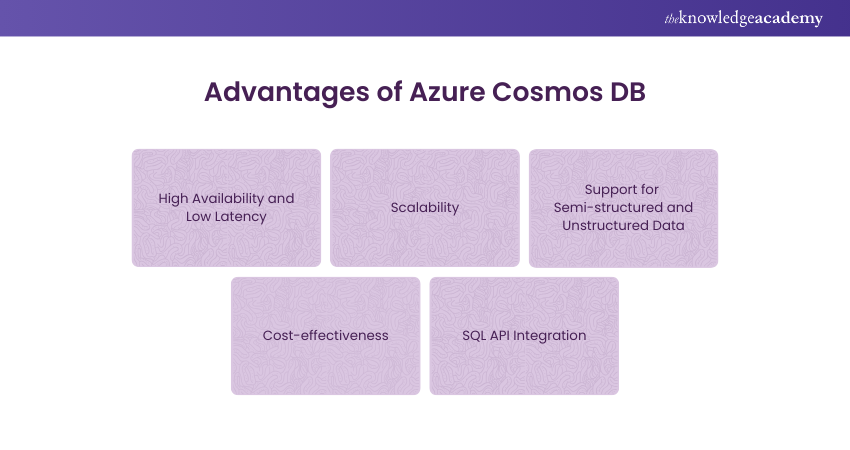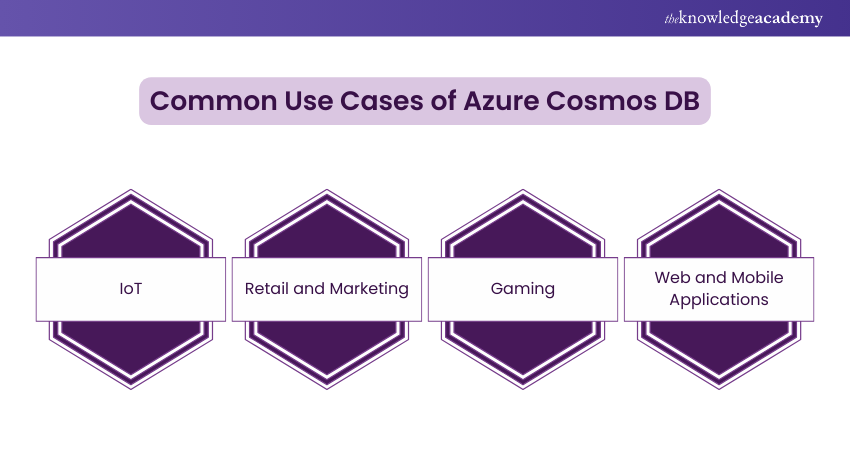We may not have the course you’re looking for. If you enquire or give us a call on +918037244591 and speak to our training experts, we may still be able to help with your training requirements.
We ensure quality, budget-alignment, and timely delivery by our expert instructors.

Looking for a fully managed, globally distributed NoSQL Database with top-notch performance and flexibility? Azure Cosmos DB is the solution you need. Designed for modern applications, this database offers multi-region distribution, high availability, and ultra-low latency. Your data is always accessible when and where you need it.
Azure Cosmos DB supports multiple data models and, has built-in security, and scales automatically. It handles massive workloads effortlessly and provides the reliability and speed that mission-critical applications need. Start exploring Azure Cosmos DB today and enjoy seamless scalability for your applications.
Table of Contents
1) What is Azure Cosmos DB?
2) How Does Azure Cosmos DB Work?
3) The Competitor of Azure Cosmos DB
4) Pricing Details of Azure Cosmos DB
5) Advantages of Azure Cosmos DB
6) Disadvantages of Azure Cosmos DB
7) Common Use Cases of Azure Cosmos DB
8) Conclusion
What is Azure Cosmos DB?
Azure Cosmos DB is a globally distributed, low-latency, multi-model database designed for managing data at large scales. Offered as a cloud-based NoSQL database through Microsoft Azure’s Platform as a Service (PaaS), it boasts high availability, high throughput, and reliability, often being referred to as a serverless database. Cosmos DB includes Azure Document DB and is accessible worldwide.
Key features include:
a) Global Distribution: Fast access worldwide.
b) Multi-model Support: Document, key-value, graph, and column-family models.
c) Automatic Scaling: Adjusts throughput and storage as needed.
d) Comprehensive SLAs: Guarantees on performance metrics.
e) Integrated Security: Encryption and advanced threat protection.
f) Serverless Option: Pay only for resources used.
How Does Azure Cosmos DB work?
When a global website writes data to a primary database in one location, users close to that location can access the data faster than users farther away. This is because of network delays for distant users.
Azure Cosmos DB, however, supports multi-master mode. This means data can be written to multiple databases around the world at the same time. The data is then copied to the closest region for users to access quickly. However, there can still be a small delay in replication, which affects consistency.
Consistency means the data is the same everywhere at any time. Cosmos DB offers different consistency levels that affect speed and availability in different ways:
a) Eventual: Data is written to the primary node and eventually copied to the secondary nodes. Users may see outdated data for a short time.
b) Consistent Prefix: Data is read in the same order it was written.
c) Session: The user who wrote the data can see it immediately, but others might experience a short delay.
d) Bounded Staleness: Data replication is delayed for a set period of time.
e) Strong: All users see the latest data, but performance is slower.
In Cosmos DB, you can choose a default consistency level when you create it. You can also change the consistency level when retrieving data from the database.
Build a strong foundation in Cloud Services with our Microsoft Azure Fundamentals AZ-900 Certification - Start your journey today!
The Competitor of Azure Cosmos DB
There are many competitors in the database market, including big names. The competition features services like Google Cloud Platform, Azure Functions, and similar PaaS options. Google recently launched Cloud Spanner. Amazon offers Amazon DynamoDB, a fast and flexible NoSQL database, making it a key player in the DynamoDB vs. MongoDB comparison. Additionally, Azure Cosmos DB competes with traditional database companies such as Oracle.
Pricing Details of Azure Cosmos DB
As a Platform as a Service (PaaS) offering, Azure Cosmos DB provides a turnkey solution that evolves over time with new features and applications. This continuous improvement ensures your database benefits from the latest advancements without additional effort.
Pricing Structure:
1) Data Throughput:
a) Measured in Request Units per Second (RU/s).
b) Cost: £0.061 per hour for every 100 RU/s provisioned
2) Data Storage:
a) Charged based on the amount of data stored.
b) Cost: £0.19 per GB per month
3) Additional Provisioning Option:
a) Provisioned Request Units per Minute:
i) Allows consumption of a bucket of requests on a per-minute basis, capped at 1,000 RU/min for every 100 provisioned throughput units per second.
ii) Cost: £0.021 per hour for each unit
Advantages of Azure Cosmos DB
Azure Cosmos DB offers several advantages for organisations managing large volumes of sporadically generated, short-lived data. It excels in scenarios requiring high availability, globally distributed access, and low latency, making it a cost-effective solution for handling ephemeral data. Here are some key advantages based on the information provided:

a) High Availability and Low Latency: Cosmos DB ensures rapid access to data from anywhere in the world with minimal delays. This makes it ideal for demand-driven activity with unpredictable spikes.
b) Scalability: The system easily expands and contracts based on the level of demand. This provides organisations the flexibility to handle both high and low traffic efficiently.
c) Support for Semi-structured and Unstructured Data: Cosmos DB can reliably store and process various data types like JSON and NoSQL, which are not suited for traditional relational databases.
d) Cost-effectiveness: Compared to Relational Database Management Systems (RDBMS), Cosmos DB offers a more affordable solution for processing transient, high-demand data.
e) SQL API Integration: With its familiar SQL API, Cosmos DB offers an easy entry point into modern database technologies such as document databases, JSON, and big data. It also complements traditional relational database systems effectively.
Automate Admin Processes effortlessly with our Automating Administration with PowerShell AZ-040 Training - Register now to enhance productivity!
Disadvantages of Azure Cosmos DB
Here are the disadvantages of Azure Cosmos DB based on the given information:
a) High Costs: Azure Cosmos DB can be expensive, especially when used for data storage, which might be better suited to Azure Table Storage or Blob Storage. It is more appropriate for querying and updating data rather than simply storing unstructured data.
b) Difficulty in Managing Resources: Due to the charging model, reducing resource usage is essential to keep costs low. However, without additional Cosmos DB tooling, it can be challenging to determine the resources (DTUs) and Request Units (RUs) consumed by individual queries.
c) Complex Auto-indexing: Cosmos DB uses auto-indexing, which is important for correctly configuring. Unfortunately, the process is not very intuitive and may require significant effort to master.
d) Challenging Data Migration: Migrating data between SQL Server and Azure Cosmos DB is notoriously difficult. While there is an open-source Database Migration Tool for small migrations, it lacks high performance and struggles with larger migrations. Azure Data Factory, another option, can be complex to set up for smaller tasks.
e) Best for Development on Free Plans: To save costs, it is advisable to develop Cosmos DB databases using a free plan or an emulator and transfer them later. This approach minimises expenses during the development phase.
f) Limited ODBC Driver: The ODBC driver is only suitable for simple queries, which may limit its usefulness for more complex database operations.
g) Complex Setup Process: Setting up a Cosmos DB database can be tricky, and the official documentation is not always clear. Tasks like deleting databases or containers can be cumbersome. To simplify the process, Azure Container Registry can help streamline container management, reducing the need for external resources or help from online guides to navigate the interface.
h) User Interface Challenges: Although GUIs are meant to provide an intuitive interface, the Cosmos DB portal can feel unnecessarily complicated. Many users rely on online guides to navigate it, defeating the purpose of an easy-to-use interface.
Common Use Cases of Azure Cosmos DB
Cosmos DB allows for high throughput and global data storage. Here are some common use cases:

a) IoT: Manages large amounts of data from various global locations, needing quick writing, analysis, and retrieval.
b) Retail and Marketing: Handles large volumes of data related to product catalogues, logistics, and inventory efficiently.
c) Gaming: Used in games like The Walking Dead: No Man’s Land and Halo 5: Guardians for low-latency in-game stats, scoreboards, and social media integration.
d) Web and Mobile Applications: Ideal for modelling social interactions, integrating with third-party services, and building personalised user experiences.
Fast-track your career with Microsoft Azure Certification – Get the expertise to excel in the cloud industry!
Conclusion
Azure Cosmos DB is a flexible NoSQL Database built for global scalability and fast access to data. It supports various data models and consistency levels, making it ideal for modern applications. While it can be costly and complex, it offers powerful features for managing distributed data efficiently.
Get certified in Microsoft Azure Cosmos DB DP-420 Course and take your Cloud Database Management to the next level!
Frequently Asked Questions
What are the Capabilities of Azure Cosmos DB?

It offers global distribution, automatic scaling, and multi-model data support. Provides low latency, high availability, and multiple consistency levels.
Which Azure Cosmos DB API Should you use?

The choice depends on your data model. Use SQL for document-based data, MongoDB for NoSQL and Cassandra for wide-column. You can also use Gremlin for graph data and Table API for key-value pairs.
What are the Other Resources and Offers Provided by The Knowledge Academy?

The Knowledge Academy takes global learning to new heights, offering over 30,000 online courses across 490+ locations in 220 countries. This expansive reach ensures accessibility and convenience for learners worldwide.
Alongside our diverse Online Course Catalogue, encompassing 19 major categories, we go the extra mile by providing a plethora of free educational Online Resources like News updates, Blogs, videos, webinars, and interview questions. Tailoring learning experiences further, professionals can maximise value with customisable Course Bundles of TKA.
What is The Knowledge Pass, and How Does it Work?

The Knowledge Academy’s Knowledge Pass, a prepaid voucher, adds another layer of flexibility, allowing course bookings over a 12-month period. Join us on a journey where education knows no bounds.
What are the Related Courses and Blogs Provided by The Knowledge Academy?

The Knowledge Academy offers various Microsoft Azure Certification, including Microsoft Azure Cosmos DB DP-420 Course, Automating Administration with PowerShell AZ-040 Training and Microsoft Azure Fundamentals AZ-900 Certification. These courses cater to different skill levels, providing comprehensive insights into the Azure Container Registry.
Our Microsoft Technical Blogs cover a range of topics related to Microsoft Azure, offering valuable resources, best practices, and industry insights. Whether you are a beginner or looking to advance your skills in Microsoft Technical, The Knowledge Academy's diverse courses and informative blogs have you covered.
Upcoming Microsoft Technical Resources Batches & Dates
Date
 Microsoft Azure Cosmos DB DP-420 Course
Microsoft Azure Cosmos DB DP-420 Course
Mon 2nd Jun 2025
Mon 25th Aug 2025
Mon 3rd Nov 2025






 Top Rated Course
Top Rated Course



 If you wish to make any changes to your course, please
If you wish to make any changes to your course, please


